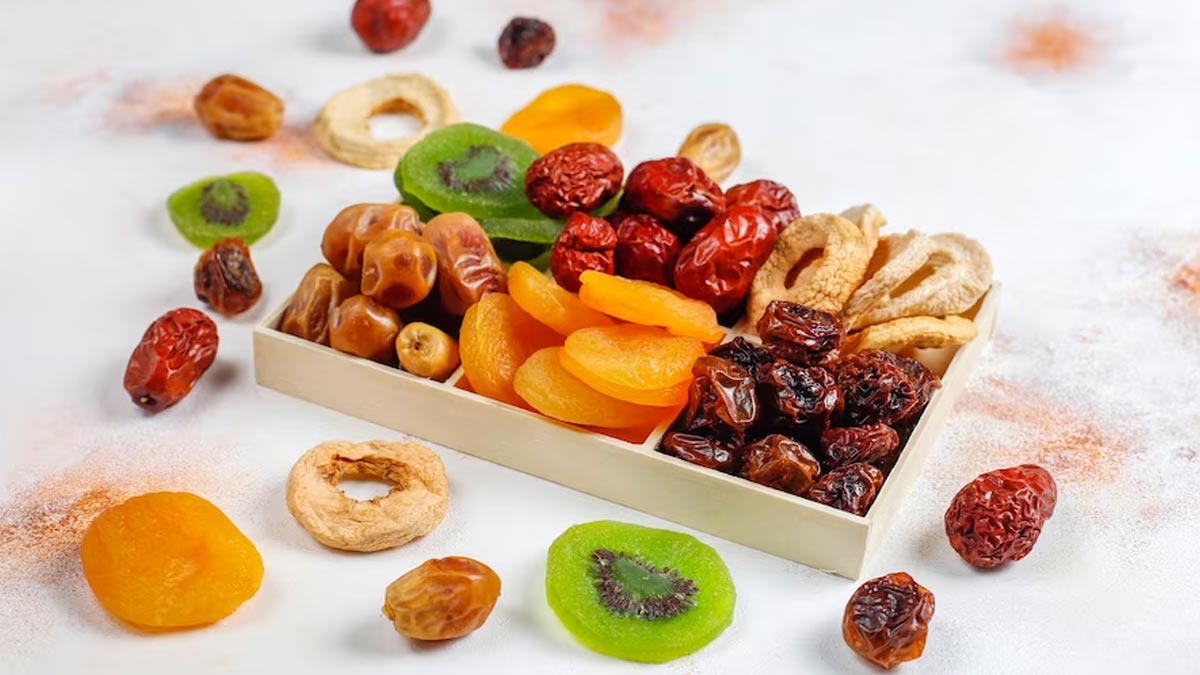
Navratri celebrations are in full swing. Hindu devotees from around the world observe the festival by worshipping goddess Durga and observing fast for nine days. During this time, people refrain from having certain foods, including grains, such as wheat, rice, and oats, non-vegetarian foods, legumes, processed foods, and refined sugar. Instead, one can choose to have healthy alternatives, such as buckwheat and water chestnut, fruits, nuts and seeds.
Table of Content:-
In addition, dry fruits are a super healthy food group to have during Navratri fasting, according to Dr Pradeep Srivastava, Ayurvedic Expert, Krishna's Herbal and Ayurveda. “They are packed with several bioactive compounds, such as minerals, vitamins, phytochemicals, carotenoids, and antioxidants,” he says. But apart from its goodness, knowing the right way to consume them, selecting the right dry fruits, and choosing the right time to have them can maximise its benefits, as per Ayurveda. Here’s what the expert has to say about the same.
Also Read: Navratri Fasting Foods: Expert Lists Foods To Eat And Avoid
Benefits Of Dry Fruits According To Ayurveda

Ayurveda is an ancient medicinal system that has its historical roots in the Indian subcontinent.
When it comes to understanding the benefits of dry fruits through the lens of Ayurveda, Dr Srivastava says, “They are considered a powerhouse of vitality (prana) and essential nutrients that provide a quick energy boost, enhance stamina, and help combat fatigue. It is also believed that consuming dry fruits helps maintain a balance of doshas (Vata, Pitta, and Kapha). They are high in dietary fibre, which aids digestion and improves gastrointestinal health. This results in enhanced nutrient absorption and helps prevent digestive issues.”
In general, a study published in the Journal Nutrients suggests that dry fruit intake may improve glucose metabolism, reduce other cardiovascular risk factors, and lower the risk for osteoporosis. Dr Srivastava says that dry fruits like figs and dates are rich in calcium and other minerals that are important for bone health.
How To Pick Dry Fruits As Per The Doshas
According to Ayurveda, an individual's constitution is influenced by their unique blend of 'doshas' - Vata, Pitta, and Kapha, Dr Srivastava says.
He elaborates that these dynamic energies are believed to be responsible for a person’s emotional, mental and physiological health and that every person is supposed to have a unique ratio of each dosha, with one dominating the others.
Different dry fruits are recommended based on a person's primary dosha to help achieve balance and well-being. Here’s a look at the recommended dry fruits as per the doshas:

Vata Dosha
Vata is associated with the elements of air and space, which makes individuals imaginative and lively but also prone to mood swings and dry skin. “To balance Vata, it's recommended for them to choose dry fruits like walnuts and almonds. These dry fruits have warming and grounding properties, which help to balance Vata's inherent coldness and lightness,” Dr Srivastava suggests.
Pitta Dosha
Pitta is characterised by fiery and watery qualities, making individuals enthusiastic, and goal-oriented. They may, however, experience inflammation and irritation. Those with a prominent Pitta dosha should choose cooling dry fruits like dried apricots, raisins, and figs to balance their dosha. These options help reduce the heat and acidity associated with Pitta.
Kapha Dosha
Kapha, which is associated with earth and water, governs stability, compassion, and physical strength. However, it can also cause problems like weight gain and poor digestion due to its heaviness and coldness. According to the Ayurvedic expert, people with a Kapha constitution should opt for dry fruits with heating properties, such as almonds, walnuts, pistachios, dried figs and apricots. When consumed in moderation, these options help balance Kapha's cold and heavy qualities.
Also Read: Navratri Diet Tips For Pregnant Women: Do’s And Don’ts
Ayurveda-Recommended Way To Consume Dry Fruits

Although dry fruits are high in nutrients, they can be difficult to digest and may not sit well with certain body types, especially those with a lot of Pitta dosha, Dr Srivastava warns.
He recommends soaking them in water for 6-8 hours or overnight, which not only softens them but also reduces the ushnata (heat) in them and removes phytic acid/tannins from dry fruits, making it easier to absorb nutrition from them.
One can also choose to dry roast them before consumption, which would be more beneficial compared to eating them raw.
Ayurveda also promotes combining foods to create well-balanced, easy-to-digest meals. According to the doctor, two ways one can consume dry fruits include taking them with dairy products, such as milk or ghee. This combination is believed to have a nourishing and rejuvenating effect on the body and mind, but not all dry fruits can have the same benefits.
Certain dry fruits can also be combined with spices like cardamom, cinnamon, and nutmeg, which not only make dry fruits taste better but also help with digestion.
Timing Is Important
In case you’re wondering if there is a good time to consume dry fruits then there is. In Ayurveda, what you eat is just as important as when you eat. When it comes to dry fruits, you can eat them in the morning or between meals as snacks. In the morning, you can have a small serving of raisins, walnuts, or almonds that have been soaked overnight.
Note that overindulging in dry fruits and nuts can lead to issues such as indigestion, loose stools, acne problems, and weight gain. One must learn to strike a balance. “By choosing the right dry fruits, preparing them mindfully, and consuming them in moderation, you can enjoy the festive season without compromising your well-being,” Dr Srivastava concludes.
Also watch this video
How we keep this article up to date:
We work with experts and keep a close eye on the latest in health and wellness. Whenever there is a new research or helpful information, we update our articles with accurate and useful advice.
Current Version
